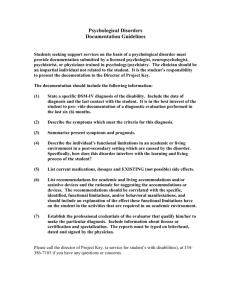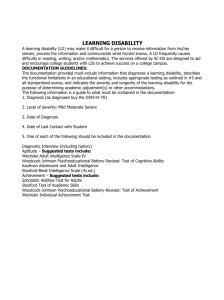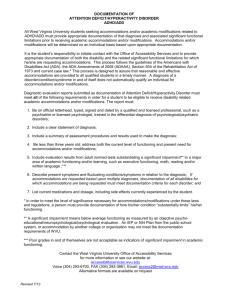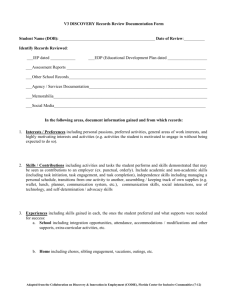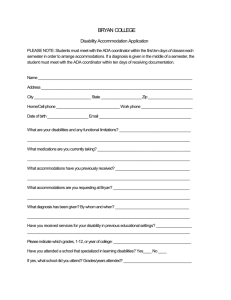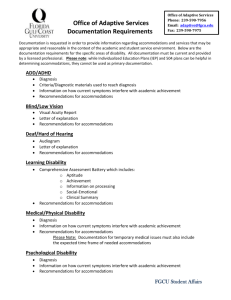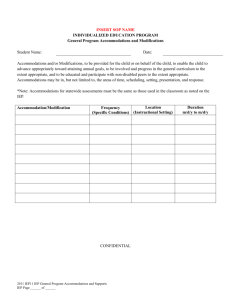DOCUMENTATION GUIDELINES - Wallace State Hanceville
advertisement
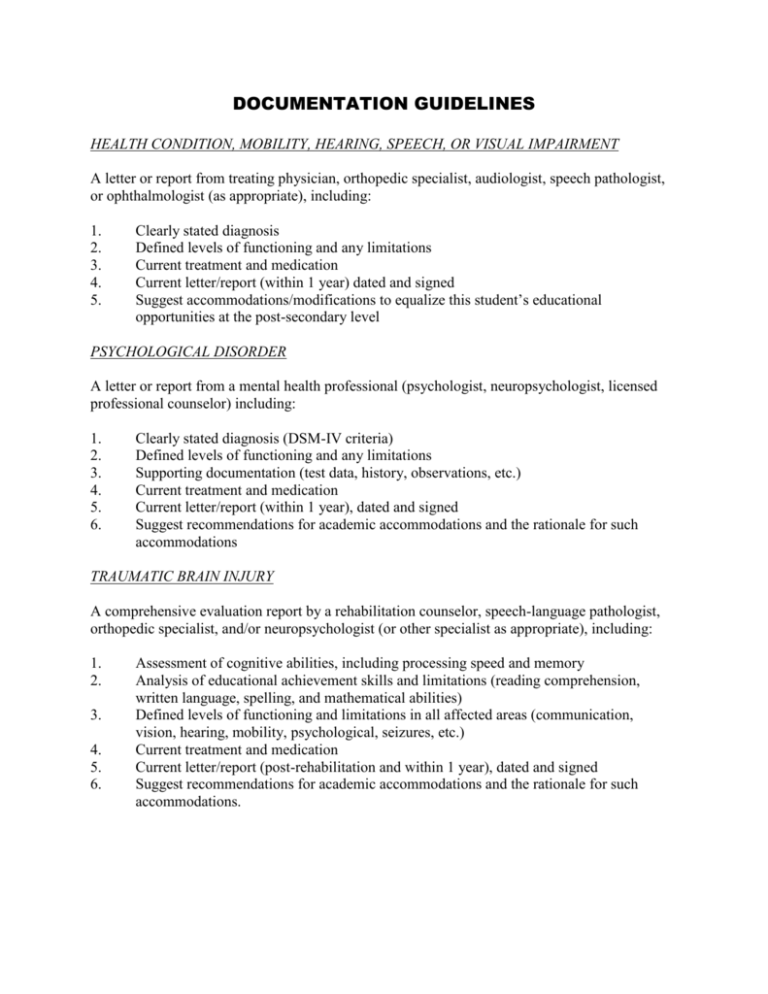
DOCUMENTATION GUIDELINES HEALTH CONDITION, MOBILITY, HEARING, SPEECH, OR VISUAL IMPAIRMENT A letter or report from treating physician, orthopedic specialist, audiologist, speech pathologist, or ophthalmologist (as appropriate), including: 1. 2. 3. 4. 5. Clearly stated diagnosis Defined levels of functioning and any limitations Current treatment and medication Current letter/report (within 1 year) dated and signed Suggest accommodations/modifications to equalize this student’s educational opportunities at the post-secondary level PSYCHOLOGICAL DISORDER A letter or report from a mental health professional (psychologist, neuropsychologist, licensed professional counselor) including: 1. 2. 3. 4. 5. 6. Clearly stated diagnosis (DSM-IV criteria) Defined levels of functioning and any limitations Supporting documentation (test data, history, observations, etc.) Current treatment and medication Current letter/report (within 1 year), dated and signed Suggest recommendations for academic accommodations and the rationale for such accommodations TRAUMATIC BRAIN INJURY A comprehensive evaluation report by a rehabilitation counselor, speech-language pathologist, orthopedic specialist, and/or neuropsychologist (or other specialist as appropriate), including: 1. 2. 3. 4. 5. 6. Assessment of cognitive abilities, including processing speed and memory Analysis of educational achievement skills and limitations (reading comprehension, written language, spelling, and mathematical abilities) Defined levels of functioning and limitations in all affected areas (communication, vision, hearing, mobility, psychological, seizures, etc.) Current treatment and medication Current letter/report (post-rehabilitation and within 1 year), dated and signed Suggest recommendations for academic accommodations and the rationale for such accommodations. LEARNING DISABILITIES A comprehensive evaluation report from a clinical psychologist, psychiatrist, neuropsychologist, school psychologist, learning disability specialist, or diagnostician, including: 1. 2. 3. 4. 4. 5. 6. 7. Clear statement of presenting problem; diagnostic interview Educational history documenting the impact of the learning disability Alternative explanations and diagnoses are ruled out Relevant test data with standard scores are provided to support conclusion, including at least: a. WAIS-R b. Woodcock-Johnson Psychoeducational Battery-Revised including Written Language c. Woodcock-Johnson cognitive Processing Battery to substantiate any processing problems Clearly stated diagnosis of a learning disability based upon DSM-IV criteria (High School IEP, 504 Plan, and /or letter from physician or other professional will not be sufficient to document a learning disability.) Defined levels of functioning and any limitations, supported by evaluation data Current report (within 3 years of enrollment date), dated and signed The report must include specific recommendations for academic accommodations and the rationale for those recommendations. ATTENTION DEFICIT DISORDERS/ ATTENTION DEFICIT HYPERACTIVITY DISORDER A comprehension evaluation report from a physician, psychiatrist, clinical psychologist, neurologist, or neuropsychologist, including: 1. 2. 3. 4. 5. 6. 7. 8. Clear statement of presenting problem, diagnostic interview Evidence of early and current impairment in at least two different environments (comprehensive history) Alternative explanations and diagnoses are ruled out Relevant test data with standard scores are provided to support conclusions, including at least: a. WAIS-R b. Woodcock-Johnson Psychoeducational Battery- Revised, including Written Language c. Behavioral Assessment Instruments for ADD/ADHD normed on adults Clearly stated diagnosis of ADD or ADHD based upon DSM-IV criteria (High School IEP, 504 Plan, and/or letter from physician or other professional will not be sufficient to document ADD or ADHD. Medication cannot be used to imply a diagnosis.) Defined levels of functioning and any limitations, supported by evaluation data Current report (within 3 years of enrollment date), dated and signed The report must include specific recommendations for academic accommodations and the rationale for those recommendations.
